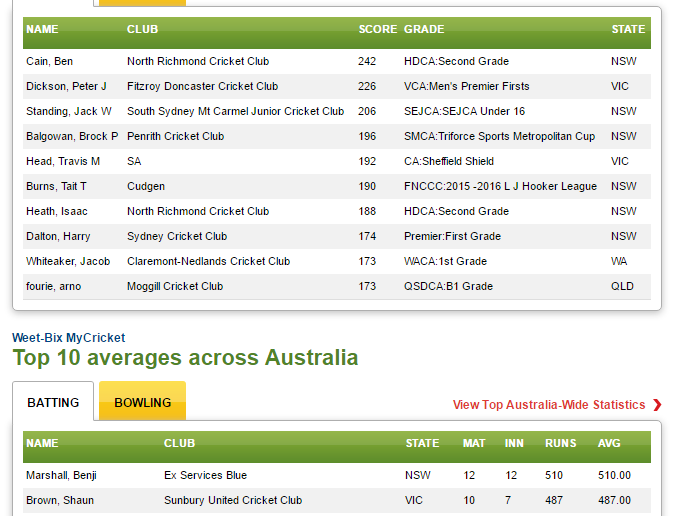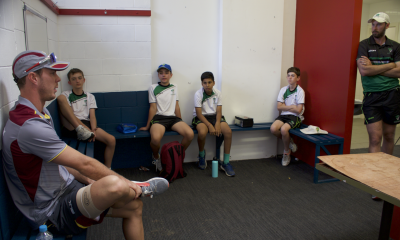So you’ve just finished your cricket season…now what?
How did you go?
Killed it…great!
Or maybe not so well, maybe your finishing the season with feelings of frustration after not being picked in the grade you wanted, not scoring enough runs or not taking enough wickets.
First things first, whether you had a good or bad season, before you take a little break away from the game and go play other sports or just give your body a rest (both of which we recommend), you need to go through the process of reviewing your season.
Most players don’t and won’t do it but self-reflection is one of the greatest ways gain an understanding of your game and ultimately become a better player.
Maybe you had some goals set, (to take x amount of wickets, or score x amount of runs). The biggest thing to remember is just because you may not have ticked of those exact numbers or results, your results may have been a little better than you think!
Self reflection is a lot more difficult and confronting if you’ve had a poor season but it’s even more important then.

Photo Above: Brisbane ACI Junior Academy players self reflecting with Chris Lynn
Here’s a 3 step process to go through for your end of season review.
Look At Your Stats. Compare Them To Last Season And Your Goals.
Most of the time stats are a fairly good reflection on how your season has gone. If you had ambitions to become a more consistent player, then here is the true nuts and bolts of it. Stats don’t lie.
Did you achieve your goals from the start of the season? And how have you gone compared to last season?
Take note of any improvements that you may have made, whether that is strike rate/more wickets/economy rates etc.
Take notes of any areas that you’ve not achieved your goals or have gone backwards from last season.
Once you’ve compared your stats take the time to ask yourself and think about why you improved in the areas you did and why you declined in the areas you did.
It’s really important to understand that sometimes your goals may not be achieved. There are a lot of uncontrollable's in cricket, it could be due to injury, bad form, weather, opportunity.
But there’s a lot of things you can control.
Work ethic, training habits, preparation, diet, fitness.
So be honest with yourself when you’re reviewing your stats and why they are the way they are.
The reality is sometimes things aren’t going to go your way, but still look at the positives. You may not have hit 1000 runs or taken 40 wickets but there will be areas of your game that have improved, and that alone is still worth noting.

TIP: Don’t gloss over area’s that have declined (a lot of players do). Note these as they will be a vital part of your plan going into preseason!
Feedback From Your Coach/Captain/Teammates.
Ask a couple of players, coaches or your captain that you look up to, respect and trust to catch up for a chat and give you some honest feedback.
A great way to get reliable feedback from someone who you have been working with all year is to write out some questions before you meet with them so that they have a clear picture of exactly what you’re seeking feedback on and allows them to give really specific answers.
Send the questions to them before you meet to give them time to think about it and give you detailed answers.
Here are some examples of questions you could ask.
What has been my most reliable trait/skill this season in your opinion?
What have I really improved on?
What areas do I need to work on?
How did you view my season as a whole?
Is there anything specific that our team is looking out for that I may be able to work on and fill the void for next season?
Do you see my role changing next year?
Some of these are great examples of getting information from coach or captain. If you haven’t had an end of season review I thoroughly suggest that you set in a time to recap with at least your coach.
If it’s not a normal process for your club/team, your coach will be happy that you’re taking the initiative towards improving your game.
It’s really important to take notes or get your coach to email you some points about how you believe your season has gone. Having these written down means you will not forget what was said in the review, and will make it easier to then set goals and set your preseason up accordingly in the coming months.
Collate All The Information You Have Received And Agree On a Plan Of Attack.
Okay so you’ve looked through your stats, got some feedback and been really honest with yourself about why you went well in some areas and not so well in others.
Now it’s time to put a plan in place with the help of your coach and that plan starts now!
How long you’re going to have away from the game.
What you’re going to do in the off season.
When you’re going to start preseason.
And exactly what you’re going to do during the off season and preseason to improve all four pillars of your game, Technical, Mental, Physical and Tactical.
You should have a very clear picture of the areas you really need to work on as well as your strengths that you want to double down on.
Create a clear and specific plan to have to primed for round one later on this year.
Let me just finish by saying this…IT’S NOT EASY
But success, bar for a few rare exceptions, doesn’t come easy.
You need to understand that it’s not going to happen overnight but if you really want it, good habits like reviewing, planning and executing performed consistently over a long period of time will get you great results.
Well done on a great season, enjoy the break and it’ll all be upon us again soon!
Authors: Nick Fitzpatrick and Joel Hamilton - ACI Co Founders and Coaches.


